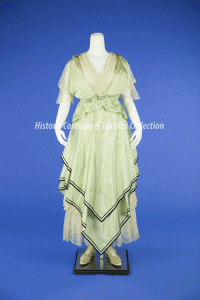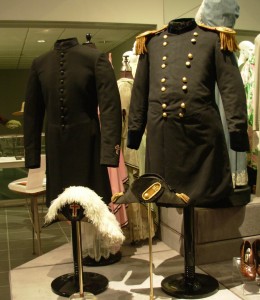October 24 – December 5, 2009 (Main exhibition)
May 5 – July 25, 2010 (Condensed version featuring student research in Thompson Library first floor exhibit cases)
View images from this exhibition.
The Historic Costume & Textiles Collection houses over 12,000 artifacts of material and popular culture, some of which provided inspiration for researchers ranging from undergraduate students to independent scholars.
Thirty items on display represent some of the variety of disciplines linked to textile and historic clothing research. They are:
- Historical research, including business history and biographies
- Art Historical research
- Design
- Textile Science research
Artifacts are accompanied by the corresponding publications — theses, dissertations, honors theses, books, essays, and chapters in books. Visitors are encouraged to pick up the publications and read them.
Dr. Harriet McBride‘s PhD dissertation on Columbus’ M.C. Lilley Company explores that company’s beginnings as a manufacturer of men’s Civil War uniforms, to later endeavors in providing regalia for fraternal organizations.
Artifacts that inspired: Men’s Knight’s of Columbus and Ohio State Government uniforms and regalia.
Robyn Gibson-Quick explored Art Deco’s influence on Fashion for her Master’s Thesis. Dr. Susan Hannel was inspired by a pair of silk printed pants from 1932, leading her to an exploration of Jazz and its relationship with fashion in the 1920s and 1930s which became her PhD dissertation.
Artifacts that inspired: The silk print 1932 pants, and a 1920s velvet cape with Art Deco designs.
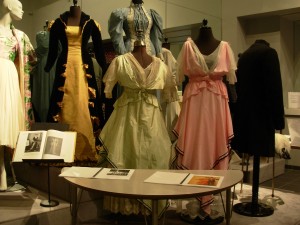 Dr. Patricia Cunningham‘s book, Reforming Fashion, 1850-1914: Politics, Health, and Art, was first presented as an exhibition in the Collection’s galleries in 2000.
Dr. Patricia Cunningham‘s book, Reforming Fashion, 1850-1914: Politics, Health, and Art, was first presented as an exhibition in the Collection’s galleries in 2000.
Artifacts that inspired: Aesthetic dress from Lancaster, Ohio and reform style dress from Medina, OH.
Honors undergraduate student Sarah Woodyard wanted to combine her interest in historical garment reproduction with the period of the 1910s. We found a dress that also reflects her and society’s current interest in social responsibility. One of the dress’s three labels is that of the National Consumer League, an organization that promoted ‘clean and healthful’ factory conditions. They were established in 1898.
Artifacts that inspired: The 1910s dress (and Sarah’s reproduction).
Above foreground: Sarah Woodyard’s undergraduate research project; background: Dr. Cunningham’s research on 19th century dress reform
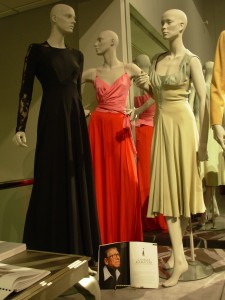 left: Dr. Joycelyn Falsken’s dissertation research on Charles Kleibacker; right: Tom Gates’ research on Irene Lentz Gibbons
left: Dr. Joycelyn Falsken’s dissertation research on Charles Kleibacker; right: Tom Gates’ research on Irene Lentz GibbonsDr. Joycelyn Falsken, Daina Palermo, and Kent State Fashion School Librarian Thomas Gates all researched the lives of 20th century fashion designers represented in the Collection. Joyce’s PhD dissertation, Daina’s Master’s Thesis, and Tom’s unpublished manuscript reveal the lives of Charles Kleibacker, Herman Patrick Tappé, and Irene Lentz Gibbons, respectively.
Artifacts that inspired: Dresses by Kleibacker, hats by Tappé, and garments by Irene.
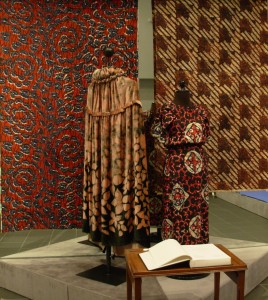 Dr. Abby Lillethun’s dissertation research on American batik
Dr. Abby Lillethun’s dissertation research on American batik
Dr. Teena Jennings-Rentenaar and Dr. Abby Lillethun explored the design aesthetics of Panamanian molas (a reverse appliqué technique) and the cross-cultural migration of the process of batik respectively.
Artifacts that inspired: Panamanian mola designs, 1920s velvet cape with batik technique.
Multiple journal articles, Master’s Theses, and PhD dissertations directed by Dr. Kathryn Jakes resulted from scientific research at the microscopic level involving clothing artifacts from an 1857 shipwreck retrieved from the ocean floor. A microscope and slides are available to view linen, silk, and wool fibers — be your own forensic scientist!

